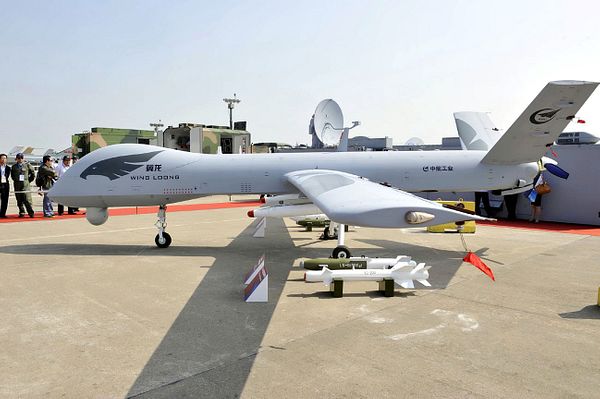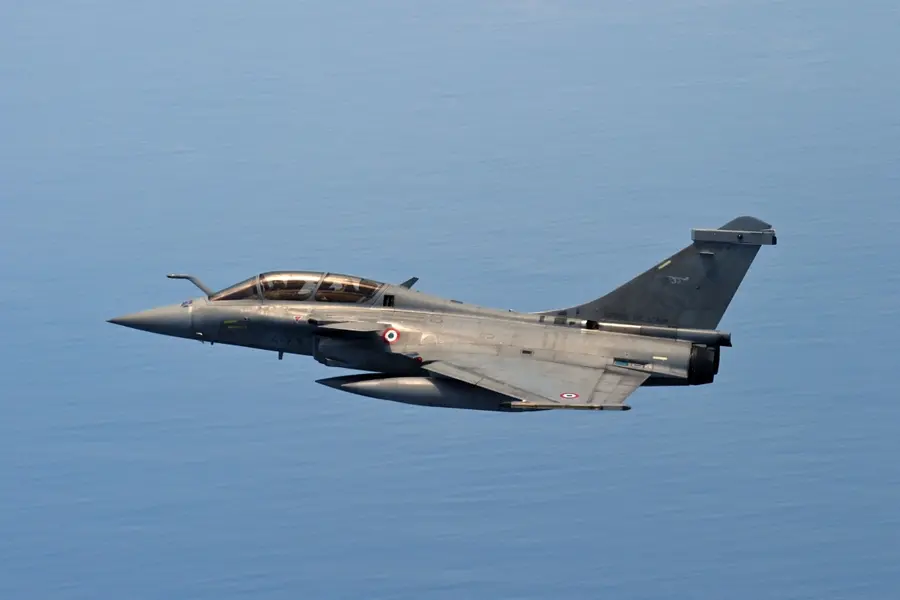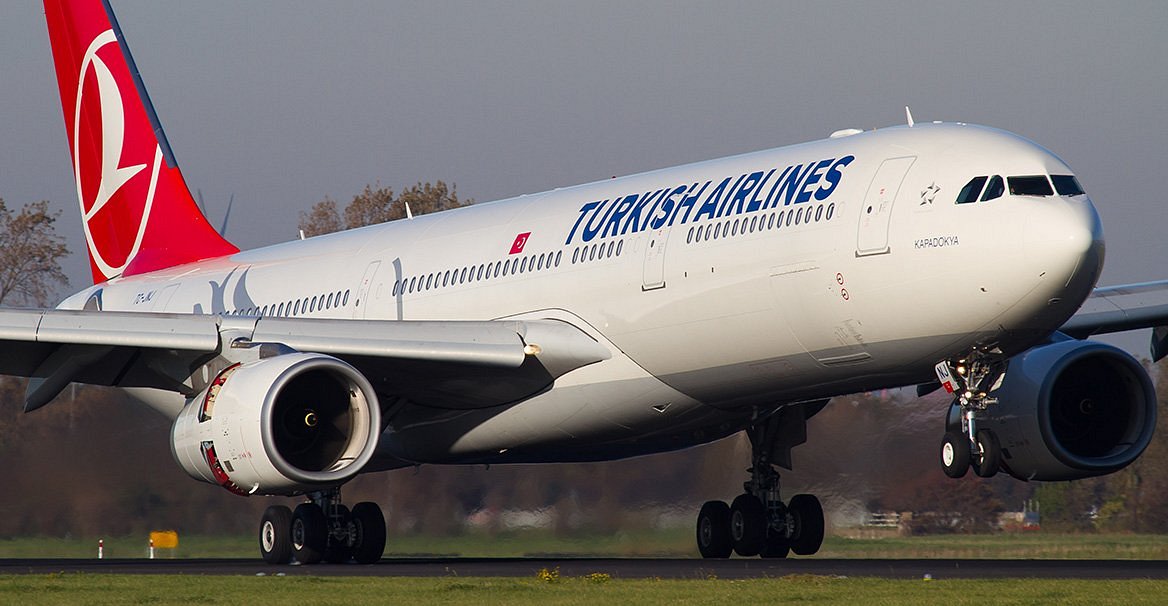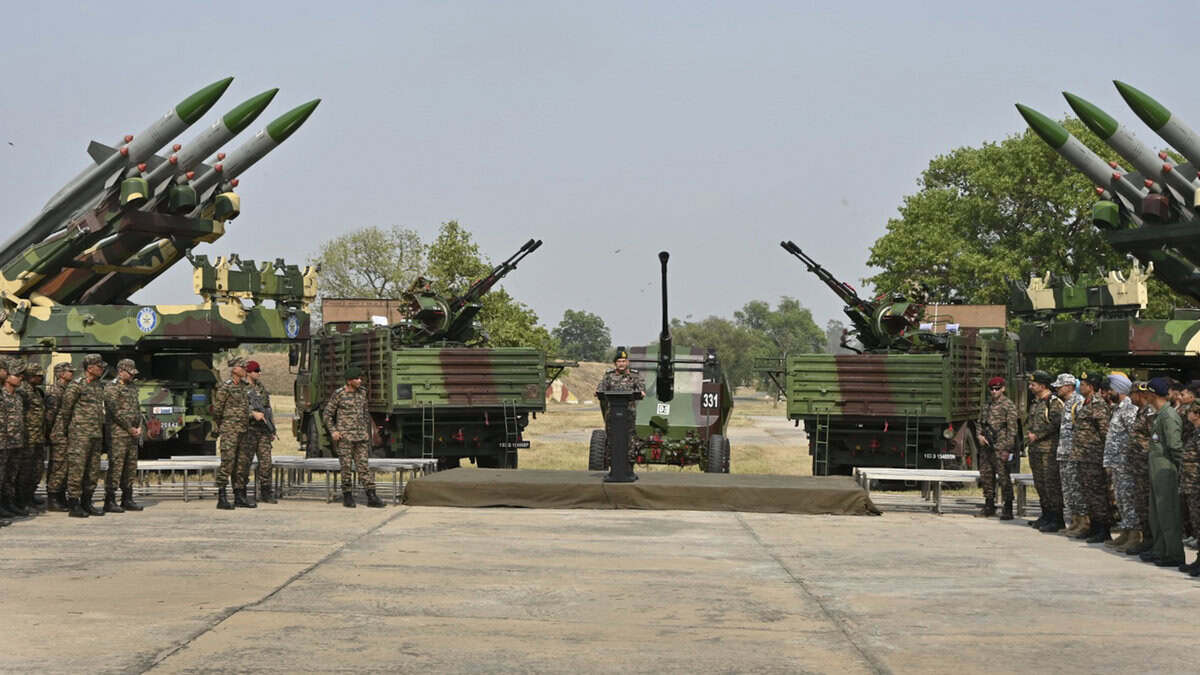SOURCE: IDRW.ORG


In a significant blow to Pakistan’s unmanned aerial capabilities, the Indian Air Force (IAF) destroyed a hangar housing multiple Chinese-made Wing Loong II Unmanned Combat Aerial Vehicles (UCAVs) at Pakistan Air Force (PAF) Base Sukkur in Sindh province during Operation Sindoor on May 7–10, 2025. Satellite imagery, corroborated by posts on X and reports from outlets like NDTV and India Today, confirms the complete collapse of the 54-meter hangar, a critical facility recently established with Chinese assistance. The strike, executed with precision using Rampage air-launched ballistic missiles (ALBMs) from IAF Jaguar Darin-II aircraft, has dealt a severe setback to Pakistan’s drone warfare capabilities, with at least one Wing Loong II confirmed lost.
Operation Sindoor was launched in response to a deadly terror attack in Pahalgam, Jammu and Kashmir, on April 22, 2025, which killed 26 civilians and was attributed to Pakistan-backed terrorist groups. The IAF targeted 11 PAF air bases, including Sukkur (also known as Bholari), to degrade Pakistan’s air and drone capabilities. Sukkur, a modern base inaugurated in 2017 under Pakistan’s Southern Air Command, is strategically located in Jamshoro district, Sindh, northeast of Karachi. It hosts advanced assets like F-16 Block-15 A/B and JF-17 Block-2 fighter jets, as well as SAAB 2000 Airborne Early Warning and Control (AEW&C) aircraft. Crucially, it serves as a hub for Pakistan’s growing fleet of UCAVs, including the Wing Loong II.
Continue readingSOURCE: IDRW.ORG


India’s indigenous Drone Detect, Deter, and Destroy system (D4S), developed by the Defence Research and Development Organisation (DRDO) and manufactured by Bharat Electronics Limited (BEL), has emerged as a game-changer in modern warfare. The system’s recent success in neutralizing Turkish-supplied drones during the India-Pakistan conflict has not only proven its combat effectiveness but also attracted significant international interest. According to a DRDO official speaking to idrw.org, inquiries from multiple countries have started pouring in for the D4 system, signaling India’s growing stature in defense technology.
The D4S, India’s first indigenously developed anti-drone system, offers 360-degree coverage, making it a formidable shield against aerial threats. Designed to counter rogue drones, including micro and small unmanned aerial vehicles (UAVs), the system has demonstrated its ability to detect, track, and neutralize threats in real time. It employs a dual-layered approach: a “soft kill” mechanism that disrupts drone communications through radio frequency (RF) jamming, Global Navigation Satellite System (GNSS) jamming, and GPS spoofing, and a “hard kill” option using laser-based directed energy weapons to physically destroy targets. The system also provides detailed optical and thermal imaging, alongside RF spectrum display on its graphical user interface, ensuring precise identification and engagement of threats.
Continue readingSOURCE: AFI


On May 7, 2025, India launched Operation Sindoor, a series of precision airstrikes targeting nine terrorist camps in Pakistan and Pakistan-occupied Kashmir (PoK) in retaliation for a deadly attack in Pahalgam, Indian-administered Kashmir, on April 22. In the wake of the operation, Pakistan’s military and media claimed a stunning victory, alleging that they shot down five Indian Air Force (IAF) aircraft, including three advanced Dassault Rafale fighter jets, during clashes near Wuyan village in Jammu and Kashmir.
These claims, amplified by pro-Pakistan social media accounts, sparked widespread debate. However, a French expert, alongside India’s Press Information Bureau (PIB) and other analysts, has decisively debunked these assertions, exposing them as part of a disinformation campaign.
Continue readingSOURCE: AFI


In recent years, India’s rise as a global economic and geopolitical player has been accompanied by intense scrutiny from Western media. From allegations of human rights abuses to criticisms of its democratic institutions, the coverage often paints India in a negative light. But is there more to this narrative than meets the eye? Former Indian Ambassador to France, Jawed Ashraf, suggested in a conversation with The Statesman Talk that commercial interests, particularly in the aerospace sector, could be fueling some of these biases. Specifically, he pointed to Western media targeting India’s indigenous aircraft, hinting at a possible motive: competition in global markets.
India’s push for self-reliance in defense manufacturing, exemplified by initiatives like Make in India, has led to significant advancements in its aerospace industry. The development of the Hindustan Aeronautics Limited (HAL) Tejas, a lightweight multirole fighter jet, has been a flagship achievement. Designed to compete with global counterparts like the French Rafale, American F-16, and Swedish Gripen, the Tejas represents India’s ambition to capture a share of the lucrative global defense market.
Continue readingSOURCE: AFI


On May 10 and 11, 2025, India’s National Aerospace Laboratories (CSIR-NAL) marked a significant milestone in its High-Altitude Platform (HAP) program. Celebrating the anniversary of its altitude-record flight, the subscale HAP—a solar-powered unmanned aerial vehicle (UAV)—repeated its remarkable feat, climbing to 24,000 feet above mean sea level (AMSL) on both days.
The subscale HAP, a prototype of CSIR-NAL’s ambitious High-Altitude Pseudo-Satellite (HAPS) program, is designed to operate at stratospheric altitudes of 18–20 kilometers (approximately 60,000–66,000 feet). Unlike traditional satellites, HAPS offers a cost-effective alternative for applications like surveillance, telecommunications, and environmental monitoring. The vehicle’s ability to loiter for extended periods—potentially months—powered by solar energy during the day and high-density batteries at night, positions it as a game-changer in the global aerospace landscape.
Continue readingSOURCE: AFI


On May 15, 2025, President Donald Trump sparked intrigue in the aerospace and defense communities by announcing plans for a twin-engine variant of the Lockheed Martin F-35 Lightning II, which he dubbed the “F-55.” Speaking at an event covered by outlets like The Aviationist, Trump described the F-55 as a “substantial upgrade” over the single-engine F-35, while also mentioning ongoing modernization efforts for both the F-35 and the F-22 Raptor. His remarks, widely shared across platforms like X, have raised questions about the feasibility, purpose, and implications of this proposed aircraft.
President Trump’s comments come amid a broader push to bolster U.S. military capabilities, particularly in response to evolving global threats from adversaries like China and Russia. The F-35, a family of single-engine, stealth multirole fighters, has been a cornerstone of U.S. air power since its introduction. However, its high costs—estimated at over $400 billion for the program—and technical challenges have drawn criticism, including from Trump during his first term.
Continue readingSOURCE: AFI


In the wake of escalating tensions between India and Pakistan following Operation Sindoor on May 7, 2025, Indian netizens have launched a fervent campaign urging the Indian government to ban Turkish Airlines from operating in the country.
The outrage stems from Turkey’s alleged supply of drones and kamikaze loitering munitions to Pakistan, which were used in attacks on Indian military and civilian sites, as well as Turkey’s vocal support for Pakistan’s stance on the Kashmir issue. Social media platforms, particularly X, have become battlegrounds for the “#BoycottTurkishAirlines” and “#BoycottTurkey” movements, reflecting growing public anger over what many perceive as Turkey’s betrayal of India’s goodwill.
Continue readingSOURCE: IANS


India’s Defence preparedness may receive a major financial push, with government sources indicating a likely Rs 50,000 crore increase in the nation’s military budget following the successful execution of ‘Operation Sindoor’.
A report in NDTV quoting government sources stated, the additional funds are expected to be allocated through a supplementary budget later this year, potentially pushing the total Defence outlay beyond the Rs 7 lakh crore mark for the first time.
Continue readingSOURCE: IANS


Defence Minister Rajanth Singh, during his visit to the Indian Air Force (IAF) base in Gujarat’s Bhuj, issued a stern warning to Pakistan and said that it has been given a breather for now and if it resorts to terror tactics again, it will face dire consequences.
Addressing the soldiers at the IAF base, Defence Minister Rajnath Singh said, “Just like the way, any habitual offender or a criminal with past antecedents is kept under watch, we have put Pakistan under probation. The ceasefire is not a cessation of action. If Pakistan doesn’t mend its ways and engages in misadventures again, our forces will teach it a firm lesson. Again!” He further said that this is ‘New India’ and if any entity or nation tries to threaten our sovereignty, they will be made to pay with severe consequences.
Continue readingSOURCE: IANS


Pakistan’s Deputy Prime Minister and Foreign Minister Ishaq Dar has come under widespread criticism for citing a fake newspaper image praising Pakistan, circulated over social media platforms, falsely claiming it to be from the UK-based paper The Daily Telegraph.
Ishar Dar referred to the fake image describing Pakistan Airforce (PAF) as the ‘undisputed king of the skies’, during his speech in the Parliament session on Thursday. Dar, while praising the PAF for its success, stated “The Telegraph newspaper writes, ‘Pakistan Airforce is the undisputed king of the skies.’ Alhamdulillah,” prompting thumping praise from the parliamentarians.
Continue readingSOURCE: PTI


The West is pitching India and China against each other, Russian Foreign Minister Sergei Lavrov said here on Thursday.
Lavrov made the remarks at a meeting of the “Culture without Borders: the Role and Development of Cultural Diplomacy” diplomatic club, according to the state-run TASS news agency. “Take note of the current developments in the Asia-Pacific region, which the West has started calling the Indo-Pacific region to give its policy a clear anti-China orientation — expecting thereby to additionally clash our great friends and neighbours India and China,” Lavrov said.
Continue readingSOURCE: ANI


A Pakistani citizen who arrived at Karnataka’s Karwar Port aboard the cargo vessel MT R Ocean was denied entry into India by port authorities, said the Indian Coast Guard. The ship, which was carrying bitumen from Iraq, docked on May 12 with 14 Indian crew members, two Syrians, and one Pakistani national on board.
The captain of the ship was also an Indian. Police Inspector Nischal Kumar had instructed that Pakistani and Syrian nationals should not disembark from the ship due to the deteriorating relations between Pakistan and India, said authorities.
Continue readingSOURCE: IANS


In a bold diplomatic push, the Prime Minister Narendra Modi government is considering dispatching multi-party MP delegations to key world capitals to expose Pakistan’s hand in the recent Pahalgam terror attack and to build global support against cross-border terrorism.
These cross-party delegations will aim to shift the global narrative by directly presenting India’s evidence and stance to foreign governments and institutions.
Continue readingSOURCE: PTI
)

Operation Sindoor has brought into sharp focus the importance of drones in modern warfare, which along with space and cyberspace will write the new paradigm of future military conflicts, a former Director General of Military Operation, who oversaw the Doklam crisis, has said.
In an interview with PTI Videos on Thursday, retired Lt. Gen. Anil Kumar Bhatt also expressed his displeasure at suggestions in social media by many war-mongers, who were unhappy with the conflict ending in four days on the grounds that it was an opportunity to reclaim Pakistan-occupied Kashmir.
Continue readingSOURCE: PTI


Adani Airport Holdings on Thursday said it has terminated the ground handling concession agreements with Turkish firm Celebi for the Mumbai and Ahmedabad airports. It also said that Celebi has been directed to immediately hand over to the company all ground handling facilities to ensure uninterrupted operations. The decision to terminate these concession agreements was taken after the Union government revoked the security clearance of the Turkish aviation firm.
It said Adani Airport Holding owns and operates the Mumbai and Ahmedabad airports, as well as the Mangalore, Guwahati, Jaipur, Lucknow, and Thiruvananthapuram airports.
Continue reading